

THE END OF THE TWENTIETH CENTURY
And the End of the Modern Age
by John Lukacs
A potpourri of pronouncements on latter-day America and Europe from a commentator who's at pains to stress: ``I am a historian, not a prophet.'' Commingling entries from a journal kept during trips to and from the Continent in recent years, Hungarian emigrÇ Lukacs (The Duel, 1991; Confessions of an Original Sinner, 1990, etc.) offers provocative perspectives on the West's past as well as present. To begin with, he asserts that the 20th century lasted but 75 years, from 1914 to 1989 (when the USSR imploded). Moreover, he contends that, the cold war notwithstanding, Communism wasn't the dominant political and social phenomenon of the times—rather, the period's major conflicts were defined by nationalism. While conceding that turning points can be elusive, the author concludes the end of the so-called Modern (as opposed to Ancient or Medieval) Age, which began circa 1500, also may be at hand. Among other factors, he attributes the presumptive transition to the destabilizing emergence of populist demands for tribal power. Meanwhile, Lukacs fears, the admixture of standard-setting aristocracy and representative democracy, which helped advance Western civilization, is in eclipse largely because the authority of contemporary states has waned as their bureaucratic governments have waxed, making them vulnerable to the tyranny of manipulated majorities (or determined minorities). Throughout, he takes an arguably racist line in allusions to the threat posed by Asian immigration and in observations on the importance of White Russians as a bulwark against barbarian hordes. A fin de siäcle appreciation that, for all its idiosyncratic analyses, affords much insight.